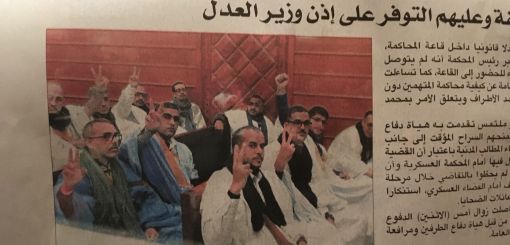
The proceedings against the so-called Gdeim Izik political prisoners from occupied Western Sahara is again adjourned, and will recommence on the 8 May at the Court of Appeal in Salé, Morocco.
In 2013, 24 men from Western Sahara were sentenced to severe punishments by a Moroccan military court, for crimes they are said to have committed in 2010.
International observers have followed the appeals process since it started on 26 December 2016. The process keeps being interrupted and postponed.
It has now been decided that the next round will take place on 8 May 2017, after the UN Security Council has addressed the Western Sahara issue at the end of the month.
The main conclusion from the international observers, is that the accused are charged with accusations solely based on the testimonies extracted under torture, and declarations that the accused claim are fabricated.
The prosecution office on 13 March backed-up the declarations with a video, which is used to allegedly document that the 2010 Gdeim Izik protest camp in fact was a violent resistance camp.
All the defendants urge that the declarations - which the charges are based on - are falsified. Several of them claim that they signed reports with blank spots, which later have been filled in. Several of the accused claim that they were tortured in front of the judge or that the signs of torture were severe (i.e. they were covered with blood or couldn't stand up, as some of them were carried in blankets when meeting the judge).
When one of the prisoners, Mohamed Embarech Lefkir, was asked why he had signed the declarations, he stated that the guards, with the judge present, had told that:
“If you don't sign, I will send you back, and you will be tortured more and worse than what you have already endured.”
All the detainees claim that they were never interrogated about the events at the Gdeim Izik, but only about the human rights and political activism.
“They tortured me, and I couldn't walk for a long time. They tried to rape me with a stick, they urinated on me, and spitted on me. I was moved to the gendarmerie where I was questioned. They asked me about my relationship to Eênama Asfari, the Polisario Front, and the delegation to Algeria. They repeated the questions, and I told them that I didn't know”, Abdullahi Toubali explained.
The accused stated that they were tortured when arrested, in custody and in prison. They tell about violent torture (i.e. the chicken method, rape, electrical shocks, pulling of finger nails, drowning, sleep-deprivation etc.).
Sidahmed Lemjeiyd told how he was transported to the gendarmerie, where he was tortured both psychological and physical;
"I was subject to every kind of torture. It's impossible to explain what I went through. The torture is a method to break us".
All the accused said that the only reason for their arrest and imprisonment are their political opinion, and that they are political prisoners. They claim that the Morocco has fabricated a story to revenge them for their political activism for self-determination.
“Everybody knows that the Gdeim Izik camp had social demands. After 28 days, when revealing the unity of the Saharawi people, the camp was attacked during the early hours on November 8th”, Adbulahi Lakfawni said.
“There are arguments that our defense has placed forward, where the court is treating a political question, by trying to cover it with a judicial blanket. This is a political issue”, Eênama Asfari said.
Morocco has occupied a part of Western Sahara since 1975, and refuses to take part in the UN-led peace talks which have the purpose of achieving self-determination for the Saharawi people.
Order our Western Sahara poster!
“Try to Visit Western Sahara”…
The Security Council fails Western Sahara and international law
On 31 October 2025, a new resolution was adopted in the UN Security Council calling on the Saharawis to negotiate a solution that would entail their incorporation into the occupying power, Morocco.
Saharawis Demonstrate Against Trump Proposal
The United States has proposed in a meeting of the UN Security Council on Thursday that the occupied Western Sahara be incorporated into Morocco.
Skretting Turkey misled about sustainability
Dutch-Norwegian fish feed giant admits using conflict fishmeal from occupied Western Sahara. Last month, it removed a fake sustainability claim from its website.



